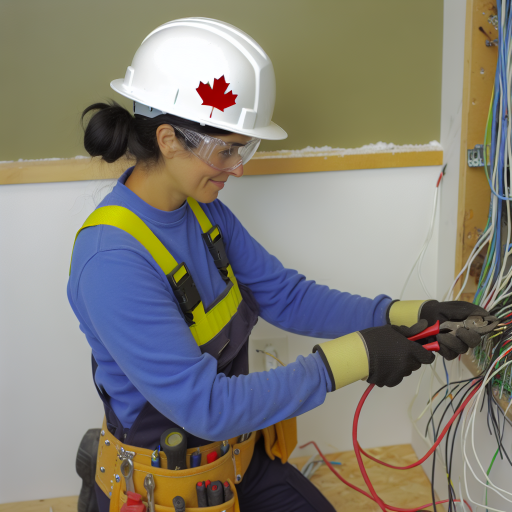Introduction
The electrical work sector in Canada has grown significantly in recent years.
Technological advancements and increased demand for energy-efficient solutions drive this growth.
Electricians play a crucial role in both residential and commercial sectors.
Their expertise ensures safety, compliance, and efficient energy use.
In modern society, electrical work is more critical than ever.
The rise of renewable energy sources, smart home technologies, and electric vehicles creates new demands.
As cities expand and infrastructure ages, skilled electricians become essential to maintain and upgrade systems.
This blog post aims to explore the rise of electrical work in Canada.
We will discuss the various opportunities available for professionals in this field.
Additionally, we will examine growth prospects driven by technological advancements and green initiatives.
Current State of the Electrical Industry in Canada
The electrical industry in Canada is experiencing significant growth.
This sector plays a crucial role in the country’s economic development.
Job opportunities continue to rise as demand for skilled electricians increases.
The transition to renewable energy sources also fuels this demand.
In this section, we will explore employment statistics, job growth, regional demands, and comparisons with other skilled trades.
Statistics on Employment Rates and Job Growth
Currently, the electrical industry employs over 150,000 Canadians.
This represents a notable increase in recent years.
The job growth rate in this sector stands at approximately 7% annually.
Projections indicate that an additional 21,000 positions will need to be filled by 2025.
Factors contributing to this growth include increased urbanization and aging infrastructure.
Here are key statistics illustrating the industry’s current state:
- Over 150,000 electricians are currently employed across Canada.
- Approximately 7% job growth rate in the electrical sector annually.
- Expected creation of 21,000 additional jobs by 2025.
- The average hourly wage for electricians is around $30.
- Majority of electricians work in the construction industry.
The rising demand for renewable energy technicians reinforces job opportunities.
Electricians play a critical role in installing solar panels and wind turbines.
More people are seeking alternatives to traditional energy sources.
This transition creates a pressing need for skilled professionals.
Comparison with Other Skilled Trades
The electrical industry stands out among skilled trades in Canada.
It offers competitive wages and robust career growth opportunities.
Many trades experience fluctuations in demand, but electricians face consistent need.
According to recent studies, electricians earn higher wages compared to several other trades.
Consider these comparisons:
- Electricians earn an average of $30 per hour, compared to $25 for plumbers.
- Welders earn about $28 per hour, showing competitive pay in this skilled trade.
- HVAC technicians earn an average of $27 per hour.
- Overall, electricians benefit from a growing job market and diverse career paths.
Moreover, the skillset required for electricians makes them adaptable to various roles.
Electricians can transition into management positions or specialize further.
This adaptability enhances their career prospects and earning potential.
Key Regions in Canada Where Demand for Electrical Work is Highest
Different regions across Canada display varying levels of demand for electrical work.
Major urban centers and regions undergoing significant development attract the most electricians.
Cities experiencing population growth and technological advancements often require electrical infrastructure.
Below are the top regions where demand remains high:
- Ontario: Home to the largest urban centers, including Toronto.
Rapid urbanization and infrastructure projects drive demand for electrical professionals. - British Columbia: Vancouver and its surrounding areas see persistent growth in construction and energy projects.
- Alberta: The oil and gas industry creates numerous opportunities for electricians, particularly in construction and maintenance roles.
- Quebec: Montreal is experiencing revitalization, increasing demand for skilled electrical personnel.
- Atlantic Canada: Provincial investments in renewable energy and infrastructure enhancements are boosting electrical job opportunities.
These regions boast strong educational programs and apprenticeships.
This results in a steady supply of qualified electricians.
Partnerships between educational institutions and the industry help address skills shortages.
The Future Landscape of the Electrical Industry
Looking ahead, the electrical industry will continue to evolve.
Innovations in technology and energy solutions will open new avenues for growth.
Smart technology and energy-efficient solutions drive the transformation.
Electricians must stay updated on emerging technologies and industry trends.
The integration of smart grids and automation will be pivotal.
Electricians will need training to navigate these technological advancements.
Moreover, with an increasing focus on sustainability, electricians will play essential roles in green energy initiatives.
The industry will see a growing emphasis on energy-efficient construction practices.
Electricians will influence how buildings are designed and constructed.
Their expertise will be critical in implementing sustainable solutions.
The electrical industry in Canada has a bright outlook, with unprecedented job growth and opportunities.
With respectable wages and career advancement potential, electricians maintain a competitive edge among skilled trades.
Various regions across the country drive high demand, particularly urban areas undergoing substantial development.
As the future unfolds, electricians will be vital in transforming Canada’s energy landscape.
The skills and adaptability of professionals in the electrical field will shape industry innovations for years to come.
By investing in training and education, individuals can seize the promising opportunities this industry presents.
Factors Contributing to the Rise of Electrical Work
Technological Advancements and Their Impact on the Demand for Electricians
Technological advancements have transformed industries worldwide.
These changes significantly affect the electrical sector in Canada.
New technologies emerge rapidly.
They require skilled electricians to install and maintain them.
For instance, smart grids have revolutionized energy distribution.
Electricians now need specialized training to work with these systems.
Additionally, the Internet of Things (IoT) has gained momentum.
Many homes and businesses adopt IoT devices for automation.
Electricians play a crucial role in integrating these devices.
They ensure that these systems communicate effectively.
As technology continues to advance, the need for electricians simply grows.
Moreover, electric vehicles (EVs) require extensive infrastructure.
Charging stations are springing up across the country.
Electricians are needed to support this growing market.
They install and maintain EV charging stations.
This trend creates more job opportunities for skilled professionals.
Increase in Renewable Energy Projects
Canada’s commitment to sustainability is evident in its renewable energy projects.
The increase in solar and wind energy initiatives creates numerous job opportunities.
Electricians are vital in bringing these projects to life.
They install solar panels and wind turbines across various regions.
Moreover, government incentives drive the adoption of renewable energy.
Homeowners and businesses feel motivated to switch to green energy.
As a result, the demand for electricians specializing in renewable projects surges.
These professionals not only install systems but also maintain them, ensuring efficiency.
In addition, the shift to a renewable energy economy encourages workforce development.
Educational institutions increasingly offer specialized training in renewable energy.
Electricians can upskill and stay relevant in this evolving landscape.
The focus on clean energy aligns with global efforts to combat climate change.
The Push for Energy Efficiency and Smart Home Technologies
The emphasis on energy efficiency is reshaping the electrical industry.
Canadian homeowners seek ways to reduce energy costs.
This quest drives the demand for electricians skilled in energy-efficient solutions.
Smart home technologies allow users to control energy consumption effectively.
For example, smart thermostats help manage heating and cooling.
Electricians are essential for installing these devices properly.
They provide consultations on the best practices for energy efficiency.
This growing market creates a niche for electricians focusing on efficiency upgrades.
Unlock Your Career Potential
Visualize a clear path to success with our tailored Career Consulting service. Personalized insights in just 1-3 days.
Get StartedAdditionally, many residential and commercial properties seek energy audits.
Electricians conduct these audits to identify inefficiencies.
They recommend solutions that lead to cost savings and reduced carbon footprints.
This trend enhances the electrician’s role significantly.
Key Opportunities in the Field of Electrical Work
As these factors contribute to the rise of electrical work, opportunities abound.
Electricians can specialize in various areas.
Here are a few promising niches in the electrical field:
- Solar Panel Installation: As solar energy demand rises, this niche will flourish.
- Smart Home Technologies: Specializing in smart technology installations offers promising prospects.
- EV Charging Stations: Expertise in charging station installation can prove lucrative.
- Energy Auditing: Helping businesses and homeowners save energy through audits can differentiate electricians.
- Industrial Electrical Work: Skilled electricians are always in demand in various industries.
With the increasing emphasis on sustainable energy solutions, electricians will play an essential role.
They will help Canada transition to a greener future.
Moreover, they will contribute to the economy by providing skilled labor needed across sectors.
The Importance of Continued Training and Certification
With rapid technological changes, continued education is vital.
Electricians must stay updated on the latest advancements.
Many institutions offer courses focused on new technologies.
Additionally, certifications can enhance career prospects.
Specialized training prepares electricians for emerging roles.
Networking within industry associations also offers benefits.
Connecting with other professionals can lead to new opportunities.
Industry conferences and workshops provide forums for learning and collaboration.
Active participation can result in higher visibility and more job prospects.
The significance of ongoing education cannot be overstated.
As the industry evolves, so must the skills of its professionals.
Electricians should remain proactive in seeking out training opportunities.
They can ensure their expertise matches the changing landscape.
The rise of electrical work is undeniable in Canada.
Various factors contribute to this growth.
Technological advancements, renewable energy initiatives, and energy efficiency measures propel the industry forward.
As opportunities abound, electricians are in a prime position to thrive.
Investing in education and training will help maintain relevance.
By specializing in emerging technologies, electricians can future-proof their careers.
The evolution of this field indicates a bright future.
Canada will continue to need skilled electricians for years to come.
With the right training and expertise, these professionals will find countless opportunities ahead.
Read: Skilled Trades Careers That Are Booming in Canada Now
Educational Pathways and Training Programs
Overview of Required Qualifications and Certifications
The electrical industry in Canada requires specific qualifications and certifications for entry and advancement.
Individuals must complete a combination of education and hands-on training.
Below are the primary qualifications needed:
- High School Diploma: A diploma or equivalent is typically required.
- Post-Secondary Education: Enroll in an electrical program at a college or technical institution.
- Apprenticeship: Complete an apprenticeship program, which includes on-the-job training.
- Certification: Obtain a Red Seal certification or provincial certification in electrical work.
- Safety Training: Complete mandatory safety training programs, like First Aid and WHMIS.
Popular Educational Institutions and Apprenticeship Programs in Canada
Canada offers a wide range of educational institutions and apprenticeship programs.
These programs equip students with the necessary skills for success in the electrical field.
Here’s a list of notable institutions and programs:
- George Brown College: Offers a comprehensive electrical program in Toronto.
- BCIT (British Columbia Institute of Technology): Provides electrical foundation programs across British Columbia.
- Algonquin College: Features a well-regarded electrical apprenticeship program in Ottawa.
- SAIT (Southern Alberta Institute of Technology): Offers a two-year electrical engineering technology diploma.
- Apprenticeship Training Canada: A nationwide program matching apprentices with employers.
Importance of Continuous Education and Specialized Training
The electrical trade is ever-evolving.
Continuous education ensures that electricians remain knowledgeable about the latest technologies and safety protocols.
Here are some reasons why continuous education is critical:
- Staying Current: New techniques and technologies emerge constantly in the electrical field.
- Career Advancement: Specialized training can lead to promotions and advanced certifications.
- Increased Safety: Ongoing education reduces workplace accidents and enhances safety practices.
- Networking Opportunities: Engaging in further training allows electricians to connect with industry professionals.
- Business Expansion: Knowledge of new services can help professionals expand their client base.
Pursuing educational pathways in electrical work opens doors to numerous opportunities.
As the demand for skilled electricians grows in Canada, attaining proper qualifications becomes imperative.
Taking advantage of established programs and institutions will pave the way for a successful career.
Interested individuals should carefully evaluate their choices.
Selecting a program or institution that aligns with personal career goals is crucial.
It will help them develop the skills necessary for a thriving future in the electrical industry.
Moreover, attending relevant workshops and conferences also provides additional learning opportunities.
These events stimulate discussions around emerging trends and innovations in the electrical field.
Networking with established professionals can lead to valuable mentorship opportunities.
Finally, continuing education isn’t solely about formal courses.
Self-study through online resources and professional journals also plays a vital role.
Electricians committed to independent learning can significantly enhance their knowledge base.
In fact, the rise of electrical work in Canada presents exciting prospects.
Armed with the right educational foundation, aspiring electricians can achieve remarkable success.
They must continually adapt and improve their skills through ongoing learning and specialized training.
Read: Building Sustainable: Green Construction

Career Opportunities in the Electrical Field
Canada’s electrical industry has seen rapid growth in recent years.
This growth opens numerous career paths for aspiring electricians.
As technology evolves, the demand for skilled electrical professionals continues to rise.
From residential projects to large-scale industrial installations, opportunities abound.
Let’s explore the various roles within the electrical field, examine emerging trends, and discuss entrepreneurship potentials.
Various Roles Within the Electrical Industry
The electrical field encompasses diverse roles that cater to various market segments.
Each role requires specific skills and knowledge.
Here’s a breakdown of the key areas in the industry:
- Residential Electricians: They install and maintain electrical systems in homes.
Their work includes wiring, lighting installation, and troubleshooting electrical issues. - Commercial Electricians: These professionals work on commercial buildings.
They handle complex electrical systems for offices, stores, and schools. - Industrial Electricians: This role involves working in manufacturing environments.
These electricians maintain machinery and ensure electrical safety in factories. - Maintenance Electricians: They focus on repairing and maintaining electrical systems.
Their role is crucial for minimizing downtime in various facilities. - Electrical Contractors: These professionals manage projects from start to finish.
They oversee installations and ensure compliance with regulations. - Specialty Electricians: This includes areas like renewable energy or telecommunications.
They provide additional expertise in niche markets.
Emerging Trends in the Electrical Field
As technology advances, new trends shape the electrical industry.
Electricians must stay updated on these innovations to remain competitive.
Some key trends include:
- Electric Vehicle Chargers: With the rise of electric vehicles (EVs), demand for charging stations increases.
Electricians are needed to install these systems in homes and public spaces. - Smart Grid Technology: Smart grids improve energy efficiency and reliability.
Electricians are essential for installing smart meters and related technology. - Renewable Energy: Solar and wind energy installations have gained traction.
Electricians play a vital role in connecting these systems to the grid. - Home Automation Systems: There is a growing interest in home automation.
Electricians are needed to install and integrate smart home devices. - Energy Storage Solutions: Battery systems allow homes to store energy.
Electricians will be increasingly involved in installing and maintaining these systems.
Potential for Entrepreneurship in Electrical Services
The electrical field also offers exciting entrepreneurship opportunities.
Skilled electricians often venture out on their own.
Here are some pathways to consider:
- Starting an Electrical Contracting Business: Experienced electricians may start their own contracting firms.
This allows for greater flexibility and control over projects. - Specialized Services: Electricians can focus on niche markets like solar energy installations.
Specialization can differentiate a business in a crowded market. - Maintenance Services: Offering routine maintenance and emergency repair services can attract clients.
Consistent work in this area provides steady revenue. - Energy Efficiency Consulting: Electricians can help businesses reduce energy costs.
Providing expert advice on energy-efficient solutions is valuable. - Smart Home Integration: With the rise of smart technology, electricians can specialize in smart home installations.
This area is becoming increasingly popular among homeowners.
The Importance of Skills Development
As the industry evolves, so does the need for continuous skills development.
Electricians must adapt to new technologies and industry standards.
Training programs and certifications play a crucial role in this process.
Here are some essential skills for electricians:
- Technical Skills: Proficiency in electrical codes and safety regulations is critical.
Electricians must understand blueprints and electrical diagrams. - Problem-Solving Abilities: Electricians frequently troubleshoot issues.
Developing strong analytical skills helps them diagnose and resolve problems efficiently. - Attention to Detail: Precision is vital in electrical work.
Failing to adhere to regulations can lead to safety hazards. - Communication Skills: Effective communication is essential with clients and team members.
Electricians must clearly explain technical concepts. - Physical Fitness: Electrical work can be physically demanding.
Electricians should maintain good health to perform their duties safely.
Job Market Outlook
The job market for electricians in Canada looks promising.
Factors such as infrastructure investment and urban development contribute to this growth.
Government initiatives to promote green energy also drive demand for electricians.
More homes and businesses seek energy-efficient solutions.
The increasing reliance on technology further expands job opportunities.
According to recent reports, employment in the electrical industry is expected to grow steadily.
Skilled electricians will find various opportunities in different sectors.
With the right training and experience, individuals can secure rewarding careers
The rise of electrical work in Canada presents numerous opportunities for individuals.
Various roles exist within the industry, from residential to industrial electricians.
Emerging technologies continue to reshape the landscape, creating demand for new skill sets.
Additionally, entrepreneurship potential allows electricians to thrive beyond traditional roles.
With a commitment to ongoing education and skills development, aspiring electricians can succeed.
As the industry grows, so too will career opportunities. In this vibrant field, workers can expect a fulfilling and lucrative future.
Read: Dealing with Workplace Hazards in Building
Challenges Facing the Electrical Workforce
The electrical workforce in Canada is currently navigating several challenges.
These challenges create complexities that affect both the present and future of the industry.
Understanding these obstacles is crucial for addressing them effectively.
Skilled Labor Shortages and the Aging Workforce
One of the most pressing issues facing the electrical workforce is the shortage of skilled labor.
Many experienced electricians are approaching retirement age.
Their departure from the industry creates a significant gap.
This gap is difficult to fill, as fewer young workers enter the trade.
Several factors contribute to this situation:
- Declining Enrollment in Trade Schools: Many young people opt for university education instead of vocational training.
This trend leads to fewer graduates in electrical programs. - Perceptions of the Trade: Some view electrical work as less desirable than other careers.
This perception negatively impacts recruitment efforts. - Rapid Technological Advances: New technologies require advanced skills.
Many potential workers feel unprepared for these demands, deterring them from pursuing the trade.
To mitigate the effects of skilled labor shortages, the industry must adapt.
Companies can invest in training programs and partnerships with local schools.
Encouraging a culture of mentorship can also help bridge the gap.
By doing so, they can better prepare the next generation of electricians.
Navigating Regulatory and Safety Standards
The electrical industry in Canada operates under strict regulatory requirements.
These regulations ensure safety and compliance, making them essential for protecting workers and the public.
However, navigating these standards can be challenging.
Key challenges include:
- Complexity of Regulations: Different provinces have various requirements.
Understanding and adhering to each region’s unique standards can be overwhelming. - Frequent Changes to Codes: Electrical codes and safety standards undergo regular updates.
Keeping up with these changes requires continuous education and training. - Compliance Costs: Ensuring compliance can be financially burdensome for smaller companies.
The costs of training, certification, and equipment can add up quickly.
To overcome these challenges, industry associations play a crucial role.
They provide resources, training, and guidance to help electricians navigate regulations.
Collaboration within the industry can foster a culture of safety and compliance.
Networking opportunities can also facilitate information sharing among professionals.
Economic Factors Influencing the Industry
The economic environment significantly impacts the electrical workforce.
Fluctuations in the economy can lead to uncertainty and fluctuation in demand for electrical services.
Understanding these factors is essential for planning and growth.
Several economic factors directly affect the industry:
- Cost of Materials: The price of electrical components and materials can vary greatly.
These variations directly influence project budgets and profitability. - Regional Downturns: Economic downturns can lead to reduced construction projects.
This decline impacts job availability for electricians and related trades. - Inflation Rates: Rising inflation can increase operational costs.
Higher prices for equipment, wages, and other necessities can pressure small businesses.
To address these economic challenges, companies must adopt strategic planning.
Diversifying services can help mitigate risks associated with market fluctuations.
Investing in efficient technologies can also reduce costs over time.
By remaining adaptable, businesses can succeed despite economic uncertainties.
The challenges facing the electrical workforce in Canada are significant and multifaceted.
However, they also present opportunities for innovation and growth.
Addressing skilled labor shortages requires a collective effort from industry stakeholders.
Additionally, staying informed about regulatory changes is vital for maintaining compliance.
Understanding and responding to economic factors can help businesses thrive in a competitive landscape.
By recognizing these challenges and working together, the electrical industry can lay a strong foundation for future growth.
The success of the workforce depends on collaborative efforts to overcome obstacles and seize opportunities.
As the industry evolves, adaptation and resilience will be key to navigating the future.
Read: Innovative Tech Transforming Construction
Future Outlook for Electrical Work in Canada
The future of electrical work in Canada appears promising.
Experts predict significant industry growth over the next decade.
Various factors are influencing this expansion, with technology, clean energy initiatives, and governmental support at the forefront.
Predictions for Industry Growth Over the Next Decade
Industry analysts project substantial growth in electrical work in Canada.
The following factors will likely drive this growth:
- Increased Demand for Renewable Energy: As Canada shifts to renewable energy sources, electrical work will expand in this sector.
- Infrastructure Development: Ongoing infrastructure projects require a skilled labor force to manage electrical systems.
- Smart Grid Technology: The rise of smart grids will demand skilled electricians to install and maintain these advanced systems.
- Electric Vehicle (EV) Infrastructure: With the growth of electric vehicles, more charging stations will require installation and upkeep.
- Energy Efficiency Initiatives: Government programs promoting energy efficiency will stimulate demand for electrical upgrading and retrofitting.
This predicted growth translates to more job opportunities and a stable career for electricians.
As the industry grows, so does the need for skilled workers who can adapt to changing technologies.
The Role of Government Policies in Promoting Electrical Work and Clean Energy Initiatives
Government initiatives significantly impact electrical work in Canada.
Policies aimed at promoting clean energy and sustainability are shaping the industry’s landscape.
Here are some notable government actions:
- Incentives for Renewable Energy: The Canadian government provides financial incentives for renewable energy projects.
This encourages more installations and skilled labor recruitment. - Funding for Research and Development: Investments in R&D help develop new technologies, driving the demand for electricians.
- Regulatory Support for Clean Energy: Legislation supporting clean energy regulations obligates companies to adapt.
This drives job creation in the electrical sector. - Training Programs: Government and industry partnerships create educational and training programs.
These initiatives ensure a qualified workforce for future electrical projects. - Climate Change Commitments: Canada’s commitment to reducing carbon emissions supports a boom in electrical work associated with green technologies.
These policies not only promote job creation in the electrical field but also encourage innovation in the industry.
As the government emphasizes sustainability, the electrical sector becomes more vital to achieving environmental goals.
Innovations and Technologies That May Shape the Future
Technological advancements are continuously reshaping the electrical industry.
Several innovations are poised to influence the future of electrical work in Canada:
- Smart Home Technologies: IoT devices and smart home systems will require specialized electrical expertise for installation and maintenance.
- Advanced Energy Storage Solutions: Developments in battery technology will enhance energy efficiency and sustainability.
- Artificial Intelligence (AI): AI will support predictive maintenance and optimize electrical systems, increasing efficiency.
- Modular Electrical Systems: Prefabricated and modular solutions simplify installations and reduce labor costs, requiring specialized electricians.
- Microgrid Solutions: As communities adopt microgrids for localized power generation, electricians will play a critical role in their implementation and maintenance.
Each of these innovations requires skilled electricians to implement and support them.
As technology evolves, new specialties emerge within the electrical workforce.
The outlook for electrical work in Canada is vibrant.
Demand for skilled electricians will grow as the industry expands.
Government policies and innovations will continue to drive changes in the sector.
As renewable energy and smart technologies become more prevalent, the need for electrical professionals will only increase.
Investing in training and staying updated with industry advancements will prove beneficial for current and future electricians.
The next decade promises a wealth of opportunities for those entering or advancing in the electrical field.
Conclusion
In summary, the electrical sector in Canada presents significant opportunities alongside notable challenges.
The increasing demand for renewable energy sources creates a need for skilled electricians.
Emerging technologies, including smart grids and battery storage, further drive this demand.
Additionally, the expansion of electric vehicle infrastructure requires a skilled workforce to meet these needs.
Despite these opportunities, challenges persist.
The industry faces an aging workforce and skill shortages.
Many experienced electricians are retiring, creating gaps in expertise.
Furthermore, ongoing training is essential to keep pace with evolving technologies and standards.
New entrants into the field will need to embrace lifelong learning to succeed.
However, the growth potential in the electrical sector is undeniable.
Aspiring electricians can find promising career paths and lucrative salaries.
Electricians play a crucial role in enhancing energy efficiency and sustainability in Canada.
As governments prioritize green energy initiatives, job opportunities will only expand.
We encourage potential electricians to consider this dynamic field.
Pursuing a career in electrical work offers job security and opportunities for advancement.
Graduates from technical programs are well-prepared to enter the workforce.
Industry certifications can further enhance career prospects and credibility.
Ultimately, electrical work supports Canada’s transition to a greener economy.
By investing in skills and education, individuals can secure a sustainable career.
The impact of skilled electricians extends beyond homes and businesses; it shapes the entire energy landscape.
In embracing this vital profession, you contribute to a sustainable future for all Canadians.




